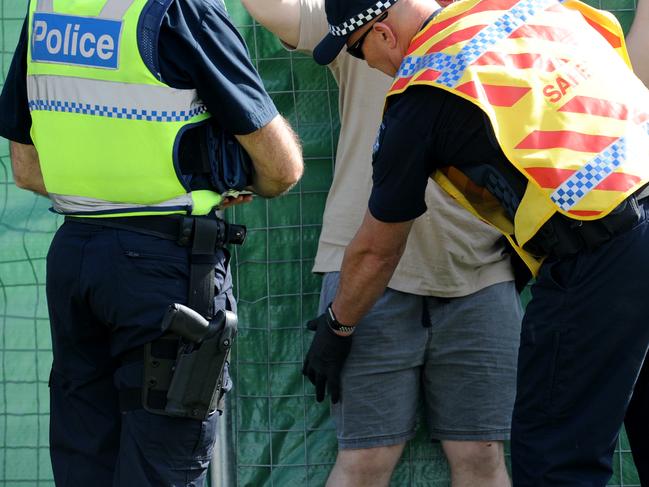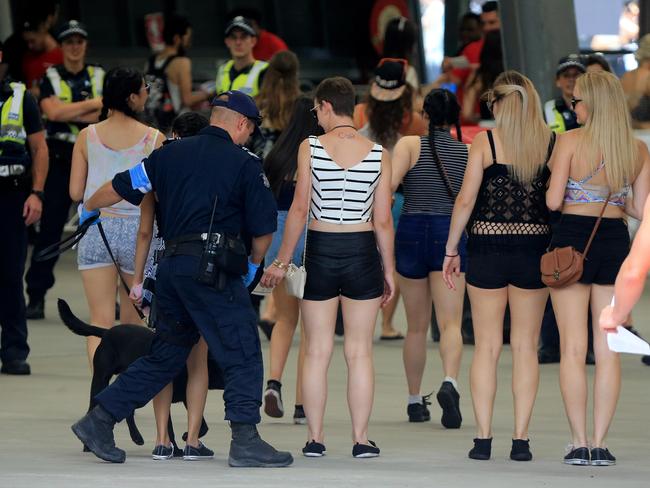Police Association’s Wayne Gatt: ‘Pill testing flies in the face of long-accepted policing principles’
Police have raised concerns that drug takers at music festivals will be given an “amnesty” and dealers will not be picked up, which could lead to turf wars.
Police & Courts
Don't miss out on the headlines from Police & Courts. Followed categories will be added to My News.
The Allan government is being urged for clarity on whether police should still search revellers at festivals for drugs once pill testing is introduced.
From later this year, partygoers will have access to free drug checks from mobile test units at music festivals, while a fixed service in inner Melbourne will be up and running next year.
But concerns have been raised regarding the police role at festivals, with some officers saying there is little point in searching for illicit drugs.
This is because under the pill testing regime it is expected officers will be unable to pounce on people lining up at the units.

It’s also unclear whether the government still wants police to undertake targeted searches 50m from the sites or even on entry to venues, given this approach would be inconsistent.
Some officers said there would be no point in searches when revellers could argue they were headed to pill testing sites, saying this would give partygoers an “amnesty”.
Police the Herald Sun have spoken to believe that given their scarce resources, searches would be a waste of time.
But others raised fears that if searches stopped altogether, dealers will not be picked up, which could lead to turf wars as crime gangs flood events.

Currently, police have powers to search people for illicit substances. Police can make arrests or initiate a diversion into a drug education program.
The state’s police union has criticised pill testing and says the government needs to outline how it expects police to counter drug-taking at festivals.
“Pill testing diminishes the illegality of illicit drug-taking in a particular area at a particular time, and that flies directly in the face of long-accepted policing principles, personal responsibility and the law,” Police Association secretary Wayne Gatt said.
In Canberra, where a pill testing facility operates, it remains a crime to sell or possess illicit drugs but police can use discretion around drug checking facilities.

Legislation will be introduced to parliament this year which the opposition has vowed to repeal if it wins government at the 2026 election.
Victoria Police said it would work with government to understand how the legislation affected its operations.
As part of the $4m trial, a mobile service will attend up to 10 music festivals this year, while a fixed site in Melbourne’s inner suburbs will open in the middle of next year.
After the 18-month trial pill testing may become a permanent feature in Victoria.

Opposition Leader John Pesutto said pill testing gave a “green light” to dangerous behaviour and “lays out a welcome mat” for drug dealers to expand their operations.
But Mental Health Minister Ingrid Stitt said evidence showed drug checking services worked, pointing to a 2022 study that found 86 per cent of drug users in Portugal and 69 per cent in Britain gave up their drugs after tests found they were different than expected.
The mobile and fixed-site services can test the contents of most pills, capsules, powders, crystals and liquids to identify toxic or deadly substances.
Premier Jacinta Allan said she had softened to the idea of pill testing only in recent years.
Her predecessor Daniel Andrews was firmly against it, also saying it sent a “green light message to people”.
Ms Allan said her position on the contentious policy changed as her children grew.
A government spokeswoman said police would continue to have a presence at music festivals. “Just like in other Australian jurisdictions, we will consult with police and other authorities on how we can work collaboratively to best support the running of the trial – any changes … will be clearly communicated,” she said.




